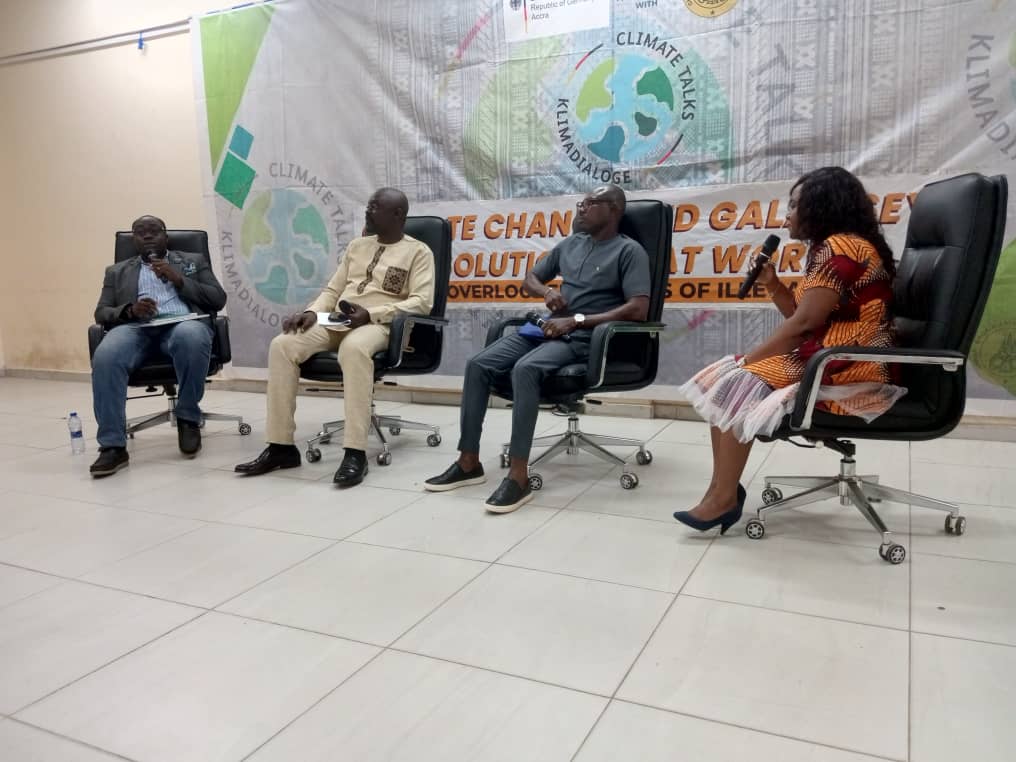|
Getting your Trinity Audio player ready...
|
The Ghana Broadcasting Corporation (GBC) in partnership with the German Embassy in Ghana has extended its dialogue session on climate, to Tarkwa in the Western Region.
The forum, which aimed to sensitise the public to be alert about climate, brought together lecturers, representatives from state and non-state institutions, youth groups, traditional leaders, and students to discuss the theme: “Overlooked impact of illegal mining”.
Addressing the gathering, Miss Sivine Jansen, the Deputy German Ambassador to Ghana said, although the Embassy worked on various topics, the current issue was selected because of its key relevance to Ghana.
She explained that on the issue of illegal mining (galamsey), the team decided to visit Tarkwa, the heart of the mining industry in Ghana because it concerned the German embassy.
She said the two countries had a close relation when it came to development cooperation, and they were investing, with a lot of money and human resources to improve things in Ghana, especially in energy production and youth education.
Miss Jansen said the assistance Germany provided and those from other donors, could be seriously undermined if Ghana had to import water in 2030 which was six years away from
now, because majority of the rivers were just too polluted and not safe anymore to be treated as water that can be used in the home.
“When we look at rivers around Tarkoradi, we talk about turbidity levels of 14,000 and that is how you measure how cloudy the water is. The Ghana Water Company Limited needs a maximum of 2000 turbidity level to be able to treat the water for adequate use.
“We are far from that, and it just gets worse, and safe for consumption is five” Miss Jansen stated
The Deputy German Ambassador to Ghana pointed out that those who live in Tarkwa and its environs already know and understand the negative effects of galamsey on health, water environment, destruction of forest and agricultural.
Although Ghana is in a pre-election time and several solutions had already been introduced to curb galamsey, more needed to be done to prevent the youth from engaging in this activity, which currently promised to be financially profitable, but posed a serious threat to the country’s future, she said.
Miss Jansen suggested that the country should start thinking of alternative methods to ensure these people mine in only designated areas, go through proper training and use the required equipment, to prevent any harmful effects on the environment.
Mr Moses Kpegbu, from the Environmental Protection Agency, Takwa office, said looking at the value chain of galamsey from digging to processing, the impacts were huge because miners do not only destroy the environment, but pollute water bodies, and bringing the mineral into the community to treat, caused the direct emissions of mercury into the environs.
Mr Kpegbu stressed that “climate change has caught up with us, and we are now at the mitigation stage and then adaptation,” and appealed to every Ghanaian to do the little they could to help tackle this climate change issue”.
Mr Kwame Nsiah Appau, a climate change advocate, who is known in the Ghanaian Music circles as ‘Okyeame Kwame,’ explained that his path towards advocacy for climate change was because it was the most important conversation in the world today, “Therefore I am using my face, voice, and music to promote and do advocacy”.
He called for a halt to illegal mining activities instead of a total ban, saying, “with proper dialogue and stakeholder mapping, we will be able to find the most prudent way of going about this without polluting river bodies, destroying farmlands and forest reserves”.
He promised to use his social media handles to promote the fight against illegal mining targeting young people and national leaders, while pressure was mounted on the requisite authorities and citizenry to ensure they do the right.
Source: myghanadaily


